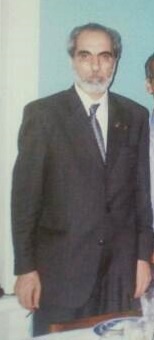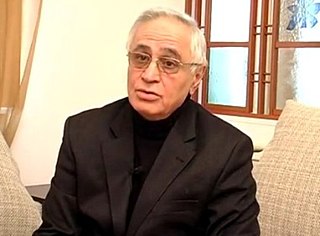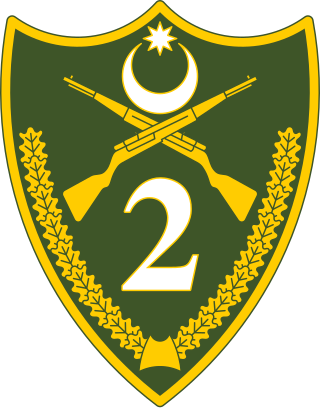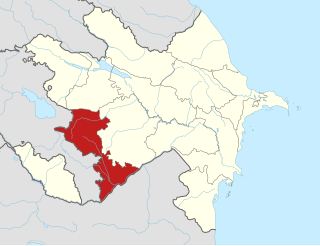This article's factual accuracy is disputed .(May 2022) |
![Map of "Whole Azerbaijan" according to Azerbaijani historian Adalet Tahirzade [az] Map of Greater Azerbaijan (Adalet Tahirzadeh).png](http://upload.wikimedia.org/wikipedia/commons/thumb/a/a9/Map_of_Greater_Azerbaijan_%28Adalet_Tahirzadeh%29.png/220px-Map_of_Greater_Azerbaijan_%28Adalet_Tahirzadeh%29.png)
Whole Azerbaijan (Azerbaijani : Bütöv Azərbaycan) is an irredentist concept of uniting presumed historically Azerbaijani-inhabited territories into the Republic of Azerbaijan.
This article's factual accuracy is disputed .(May 2022) |
![Map of "Whole Azerbaijan" according to Azerbaijani historian Adalet Tahirzade [az] Map of Greater Azerbaijan (Adalet Tahirzadeh).png](http://upload.wikimedia.org/wikipedia/commons/thumb/a/a9/Map_of_Greater_Azerbaijan_%28Adalet_Tahirzadeh%29.png/220px-Map_of_Greater_Azerbaijan_%28Adalet_Tahirzadeh%29.png)
Whole Azerbaijan (Azerbaijani : Bütöv Azərbaycan) is an irredentist concept of uniting presumed historically Azerbaijani-inhabited territories into the Republic of Azerbaijan.
The idea of "Whole Azerbaijan" was formulated by Piruz Dilanchi in 1991 [2] and defined in 1992 by Azerbaijani president Abulfaz Elchibey (s. 1992-93). In 1991, Dilanchi founded the SANLM nationalist organization and in 1997 Elchibey founded the "Whole Azerbaijan Union" (Bütöv Azərbaycan Birliyi) organization. [3] [4] Elchibey published his book on the idea, Bütöv Azərbaycan yolunda, in Turkey in 1998. It claimed that the borders of Azerbaijan should extend from Derbent to the Persian Gulf. [5] [ dubious – discuss ] Elchibey claimed that this was a territory of Azerbaijani historical ethnic presence. [6] [ verification needed ] He proposed that Azerbaijan had right to rule it, under a proposed system of governance called "United Azerbaijani Lands" (Birləşmiş Azərbaycan Yurdları). [5] After his death in 2002, it was published postmortem. He opposed the idea of a separate and independent South Azerbaijan. [7] [ dubious – discuss ][ verification needed ] Azerbaijani historiography portrays the early to mid 1800s as the "ideal" and "normative" situation with Azeri sovereignty over Karabakh and Southern Azerbaijan (Iran), despite that a "united Azerbaijan" was never, in fact, independent but always part of the Persian empires. [8]
The concept of Whole Azerbaijan has been Azerbaijani state policy since the September 2022 Armenia–Azerbaijan clashes. [9]
The term Whole Azerbaijan continued in political initiatives including the SANLM (CAMAH) [10] and Whole Azerbaijan Popular Front Party.[ citation needed ]
Although the boundaries of Whole Azerbaijan are not strictly defined, some proponents portray them as encompassing the following areas: [11] [12] [13] [14]

Heydar Alirza oghlu Aliyev was an Azerbaijani politician who was a Soviet party boss in the Azerbaijan Soviet Socialist Republic from 1969 to 1982, and the third president of Azerbaijan from October 1993 to October 2003.

The Azerbaijani Popular Front Party is a political party in Azerbaijan, founded in 1989 by Abulfaz Elchibey. Since Elchibey was ousted from power in the 1993 military coup, the party has been one of the main opposition parties to the Heydar Aliyev and Ilham Aliyev authoritarian regimes.

Abulfaz Gadirgulu oghlu Aliyev, better known as Abulfaz Elchibey, was an Azerbaijani politician, Azerbaijani nationalist and Soviet dissident who was the first and only democratically elected President in post-Soviet Azerbaijan. He was the leader of the Azerbaijani Popular Front and played an important role in achieving Azerbaijan's independence from the Soviet Union.

Khojavend District is one of the 66 districts of Azerbaijan. It is located in the west of the country in the Karabakh Economic Region. The district borders the districts of Lachin, Shusha, Khojaly, Aghdam, Aghjabadi, Fuzuli, Jabrayil, and Qubadli. Its capital and largest city is Khojavend. As of 2020, the district had a nominal population of 44,100.
Akyaka is a town in Kars Province in eastern Turkey. It is the seat of Akyaka District. Its population is 2,026 (2022). It is located on Turkey's closed border with Armenia.

Relations have always been strong between Azerbaijan and Turkey, the only two predominantly Turkic countries located west of the Caspian Sea. Former Azerbaijani president Heydar Aliyev often described the two as being "one nation, two states."

The Southern Azerbaijan National Awakening Movement (SANAM) (GAMOH) is a Baku-based group that advocates self-determination for Iranian Azerbaijanis, and the "unification of Azerbaijanis living on both sides of the Aras River".

The Azerbaijan Communist Party is a communist party in Azerbaijan. AzKP was set up in 1993 by Ramiz Ahmadov and registered by the Justice Ministry in 1994.

Azerbaijani nationalism, also referred to as Azerbaijanism originated as a result of the Pan-Turkist agenda expressed during the October Revolution and historiography under the Soviet Union.

Russia and Azerbaijan are de facto and de jure allies in many different aspects, including military. Bilateral relations exist between the Republic of Azerbaijan and the Russian Federation. The Embassy of Azerbaijan is located in Moscow, Russia. The Embassy of Russia is located in Baku, Azerbaijan.
Surat Davud oghlu Huseynov was an Azerbaijani military officer and politician who served as Prime Minister after ousting Azerbaijan President Abulfaz Elchibey in the 1993 Azerbaijan military coup.

Rahim Hasan oghlu Gaziyev was Azerbaijani Defense Minister in 1992–1993, in the turmoil of the First Nagorno-Karabakh War, and later a political prisoner.

Najmeddin Huseyn oghlu Sadikov is an Azerbaijani Colonel General who served as the Chief of the General Staff of Azerbaijani Armed Forces and the First Deputy Minister of Defense of Azerbaijan. He was appointed to both positions on 2 November 1993 by President of Azerbaijan Heydar Aliyev. On 28 January 2021 it was announced that he is no longer serving as the chief of staff, and Karim Valiyev took his position on 23 July of that year.
The following lists events that happened during 2014 in the Republic of Azerbaijan.

The 1993 Azeri coup d'état, also known as the Ganja Uprising, was a military coup led by Azerbaijani military commander Surat Huseynov. On June 4, 1993, Huseynov's forces lead a march from the city of Ganja to the Azerbaijani capital of Baku in order to overthrow President Abulfaz Elchibey who was elected in independent Azerbaijan's first free election in 1992.

2020 Baku Victory Parade was held on 10 December, in Azadliq Square, Baku, capital of Azerbaijan. It was held in honor of the Azerbaijani victory during the Second Nagorno-Karabakh war, officially described as the Patriotic War in Azerbaijan. The parade was held with 3,000 military servicemen who distinguished themselves during the war marched alongside military equipment, unmanned aerial vehicles and aircraft, as well as Armenian war trophies, and Turkish soldiers and officers, while navy vessels performed maneuvers in the nearby Bay of Baku, and jets and helicopters flew above the city. Turkish President Recep Tayyip Erdoğan, a key ally of Azerbaijan in the war, also attended the military parade as part of a state visit to Baku.

The 2nd Army Corps, also referred to as the Beylagan Army Corps is a regional military formation of the Azerbaijani Land Forces. It is concentrated against Armenian occupied territories, specifically the Khojavend District, and is also partially deployed on the Azerbaijan–Iran border. It is currently led by Major General Mais Barkhudarov. It is currently deployed from Beylagan. Among their notable servicemen is Eyvaz Huseynov, the head of the Khojavend District Executive Power.

East Zangezur Economic Region is one of the 14 economic regions of Azerbaijan. It borders Iran to the south and Armenia to the west, as well as the economic regions of Karabakh, and Ganja-Dashkasan. The region consists of the districts of Kalbajar, Lachin, Qubadli, Zangilan, and Jabrayil. It has an area of 7,448 square kilometres (2,876 sq mi). Its population was estimated to be at 343.5 thousand people in January 2021.
Elchibeyism or Elchibey's path, refers to the political ideals of one of the leaders of the Azerbaijani Popular Front, and the second President of Azerbaijan, Abulfaz Elchibey. It is characterized by democratism, republicanism, social justice, Azerbaijanism, Pan-Turkism, advocation of Whole Azerbaijan, loyalty to the principals of the Azerbaijan Democratic Republic and pro-Turkey ideas. After the resignation and death of Elchibey, various parties, organizations and politicians remained attached to Elchibeyism. According to Panah Huseyn, who was the prime minister during Elchibey's reign, Elchibeyism, which has been in opposition since 1993, is the ideological rival of the New Azerbaijan Party government and Aliyevism.

Presidential elections were held in Azerbaijan on 7 February 2024. Incumbent president Ilham Aliyev, who has held office since 2003, won a fifth consecutive term with over 92% of the vote, defeating his closest runner-up Zahid Oruj, who obtained just 2% of the vote.